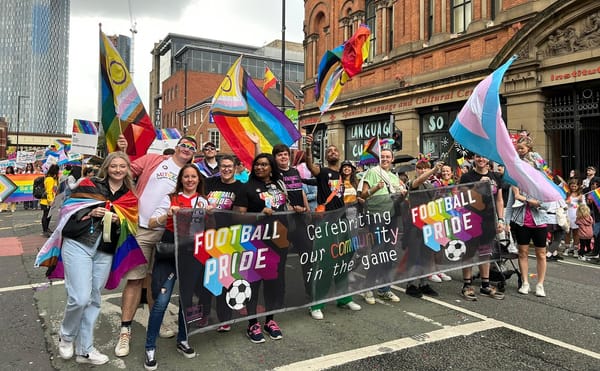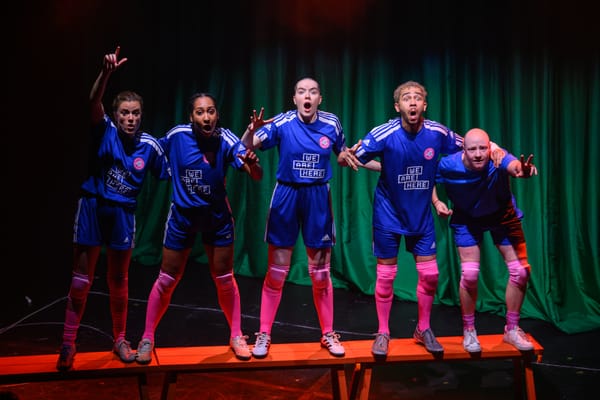I went looking for the plan to tackle homophobic chanting. Here's what I found.
I spent the week searching through dense documents, so you don't have to.
After another weekend reading headlines about homophobic chanting at a Premier League match — this time at Molineux for Wolves v Chelsea — I needed reassurance. Surely, after months of repeated headlines about hateful chanting from fans of clubs playing Chelsea FC, there’s a plan to deal with it?
This is a story of what I found when I looked into the plans to deal with the toxic culture that drives LGBTQ+ fans like me away from football.
As always, subscribe and share if you want this newsletter to continue.
First, some context. This season, we’ve seen repeated headlines about homophobic chanting by fans of clubs playing Chelsea FC. The chant accuses the Chelsea team of being ‘rent boys’, a slang phrase for male prostitutes. It is homophobic.
Every time, there’s a pattern: the chants are reported, sometimes arrests are made, the clubs involved release a statement condemning the chants, followed by the Premier League and FA.
And every time, my heart sinks. Queer people already feel like they have to hide a part of their identity to stay safe at football matches. When incidents like the ones last weekend hit the headlines, the damage is two-fold. Firstly, it puts off queer fans who are already going to games — you damage trust among an already scarce group of supporters. Secondly, it quite publicly sends a signal to fans considering attending that homophobia is still a problem on the terraces — how can we expect queer people to take the plunge and go to their first game when that’s the message the game is sending?
After so many instances reported in the news (I counted eleven news stories on the BBC’s website about homophobic chanting since the start of the current season), I wanted some reassurance that things were going to change, that the issue was being taken seriously.
I started with the Premier League and my search led me to a document called the Premier League Equality, Diversity and Inclusion Standard. Basically, it’s a set of rules to encourage Premier League clubs to be inclusive. There are three levels to the standard, preliminary, intermediate, advanced. Think about these like bronze, silver, and gold, but for how much you give a shit about racists and the like.
The idea is to “embed” inclusive “principles” into the day-to-day running of clubs. It also encourages monitoring and reporting.
So what’s the substance? Now, this isn’t unique to the Premier League or football, but the document outlining this protocol is dense and long. It was quite a struggle to get through. The crucial part says that clubs need to outline that:
“[They] have high expectations of behaviour for everyone associated with them, including staff and fans.”
“It requires that everyone associated with a Premier League Club to be fully aware of its robust stance against any form of discrimination, harassment and abuse, and that they have confidence that their Club will act when these expectations are not met.”
To meet the highest level of the standard, among other measures, clubs must have “developed an education programme for fan rehabilitation or to mitigate away from a ban” and that fans should be “fans are confident to report [equality, diversity, and inclusion] concerns to challenge peers’ inappropriate language and behaviour.”
When I read the document, I felt a little reassured. Part of the objective of having these protocols must be to make progress on inclusion, but a secondary objective should surely be to reassure marginalised communities that the league is on their side, that they’re all over this issue and that progress is on its way. So why is this work buried in a document hidden away on the website? The page about the standard isn’t even linked to from the page about inclusion on the Premier League’s website. It feels like a missed opportunity.
I turned my attention to the FA.
In January, the FA wrote to all clubs to remind them it could pursue disciplinary action against any club whose fans were found to take part in homophobic chanting. It followed an announcement by the Crown Prosecution Service that the chant in question would be classed as a homophobic slur — significant because it gave the FA the means to take action against clubs involved in chanting.
But that was in January. Since then, the chants haven’t stopped.
So I searched for a broader plan. On the FA’s website, I found something called the Football Leadership Diversity Code, which is unsurprisingly focussed on increasing diversity in football’s leadership. It’s not really anything to do with fan behaviour. (As an aside, this document contains no mention of LGBTQ+ people). On the website, the most prominent content about LGBTQ+ abuse is a page about the Rainbow Laces campaign and Football v Homophobia (which both do incredible work). There’s also a page that provides information about how to report abuse.
Eventually, I found a link to the FA’s diversity strategy, buried at the bottom of a page. It says that to “inspire the change”, the FA will “deliver initiatives across gender, ethnicity, disability, faith and LGBTQ+ communities.”
It says these will include (I’ve included only the items relevant to LGBTQ+ inclusion):
- Working with cross-football LGBTQ+ fan groups to raise awareness, break down barriers and support inclusivity of participants and spectators.
- Our Rainbow Laces campaign and engagement with Pride in London.
- Our trans policy and supporting guidance.
Now, I get this is a top-level strategy, but it doesn’t scream “there’s a culture problem” to me.
Where is the urgency? What is the route to change?
I am not questioning the intent of the people at the FA working on inclusion work. They are doing good, important work. The reiteration of the rules in January was a decent step, too. But as a queer person, reading headlines about homophobia in football again and again this season, I need more. I’m not the only one: back in January, the Football v Homophobia campaign called on the FA, clubs, the media, and police to do more. “Words are not enough,” it said.
This stuff does deep damage, and it feels like statements like the ones clubs, the Premier League and the FA release when there’s an incident don’t cut it. Words are not enough.
You might point at initiatives like Stonewall’s Rainbow Laces campaign to demonstrate that there’s change afoot. These campaigns have been increasingly prominent over the last few seasons. They are important, but they’re ultimately rather passive exercises. A player doesn’t necessarily have to be a vocal advocate to take part, they can just passively wear some different laces, and that’s job done.
The current situation demands more. The perpetrators – and there are many – need to know that there is no space for them in football. They need to know that they will cease to be able to enjoy football if they join in with homophobic chanting.
It’s clear that after months of headlines, football’s problem with homophobic chanting requires nothing short of culture change. And part of that should be a strong, transparent plan for change, built in collaboration with the LGBTQ+ community and with an emphasis on sending a strong message to the people that might take part in chants. That strong message must be underlined by strong enforcement action.
We need more than buried, jargon-laden documents buried on a website.
Until we get more action, there will be more incidents. Those incidents will drive more people away from the game. My heart will continue to sink. And football will be a worse sport for it.
When approached for comment, the FA referred me to its January statement on the issue, which says: “The FA takes all allegations of discrimination extremely seriously and would encourage anybody who has been subject to, or a witness of incidents of discrimination, to report it to The FA, the club or the relevant authorities so it can be investigated thoroughly.”
The Premier League referred me to its statement after the Wolves v Chelsea incident that said: “The homophobic chanting heard at the Wolverhampton Wanderers versus Chelsea fixture today has no place in football or society. The Premier League condemns all forms of discrimination. Football is for everyone.”
Before you go, we need your help! To make this project sustainable, we need to reach as many LGBTQ+ football fans as possible. Will you share this newsletter with just one LGBTQ+ fan and ask them to consider subscribing?
And if you’re enjoying these posts, consider donating the cost of a coffee (or more, if you feel like it). Money will go towards costs associated with running this thing. Thank you!



